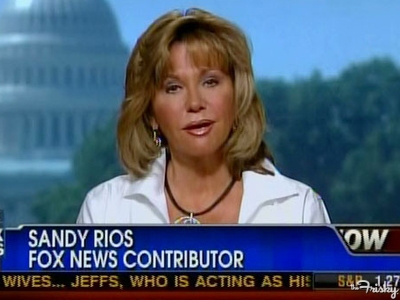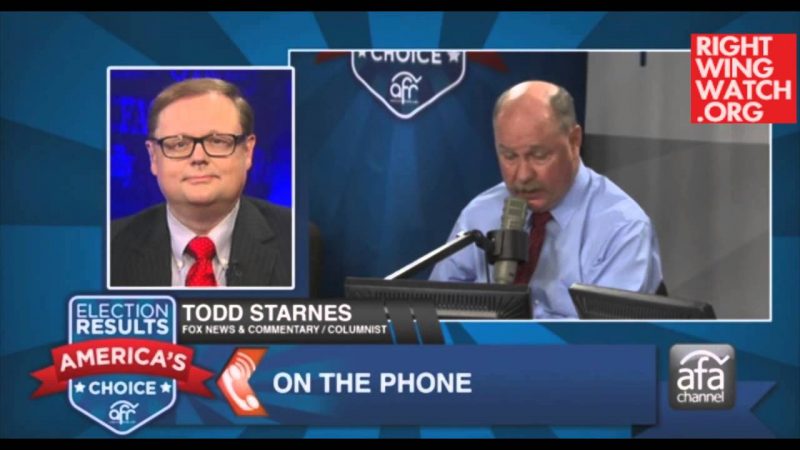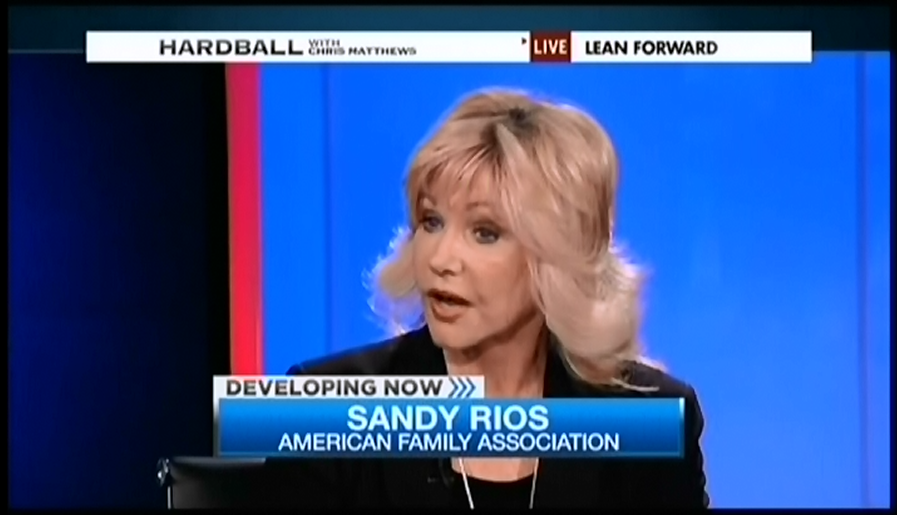The topic of discussion on Sandy Rios’ American Family Radio program Wednesday was diversity among federal judicial nominees. The Washington Post published a story over the weekend detailing President Obama’s largely successful effort to appoint more women, people of color and openly LGBT people to federal judgeships. The voice of dissent in the article was that of the Committee for Justice’s Curt Levey, who told the Post that the White House was “lowering their standards” in nominating nonwhite judges. So naturally, Rios invited Levey on as a guest and explained to him why she disapproves of President Obama’s diverse judicial nominations.
In particular, Rios disapproves of Obama’s Supreme Court nominees, Sonia Sotomayor and Elena Kagan, respectively the third and fourth women ever to sit on the high court. Sotomayor and Kagan, Rios says, have been forgetting their place and behaving “rudely,” “interrupting” and “speaking inappropriately” to, of all people, Justice Antonin Scalia.
While Levey correctly notes that “Scalia can give it out as well as take it,” he agrees with Rios that Sotomayor, the Supreme Court’s first Latina justice, “has occasionally, at least, stepped over the line.” In particular, he says Sotomayor – who he once accused of supporting “violent Puerto Rican terrorists” — “sort of lost it” during arguments on the Voting Rights Act, when she contradicted Scalia’s stunning assertion that the law represents a “perpetuation of racial entitlement.”
In fact, while Scalia’s bombast provoked audible gasps in the hearing room, Sotomayor waited several minutes before calmly asking the attorney challenging the Voting Rights Act, “Do you think that the right to vote is a racial entitlement in Section 5?”
Later, Rios, with an impressive lack of self-awareness, marvels that progressive groups criticized Scalia for his remarks. “Groups on the left,” Levey responds, “shall we say, like to personalize things.”
Rios: I read an article that Sotomayor and Elena Kagan, at least this article was intimating that they are behaving in a – these are my words – sort of rudely on the bench, to Scalia and to others, interrupting, speaking inappropriately. Have you observed that? Do you know what I’m talking about and is that true?
Levey: Um, yeah. I mean, you know, Scalia can give it out as well as take it, but yeah, Sotomayor has gone over the line a number of times. Most recently in the Voting Rights Act case, which was just last week, where, you know, Scalia had the nerve to speak the truth and refer to the Voting Rights Act as “racial preferences,” which of course is what it’s become by guaranteeing that there be minority districts formed, minority congressional districts. And, you know, Sotomayor sort of lost it when Obama [sic] said that, interrupted and you know, basically made fun of Scalia’s comment. So yeah, I think they have the right to be aggressive up there, but Sotomayor has occasionally, at least, stepped over the line.
Rios: And on the Voting Rights Act and Scalia’s comments, you know, there were demonstrators at the Court last week, hundreds of them, demonstrating against Antonin Scalia. I don’t remember that happening. I don’t remember a Supreme Court justice – doesn’t mean it hasn’t happened – but I don’t remember it being a subject of public demonstrations.
Levey: No. Typically they will, you know, they’ll, protestors at the Supreme Court will focus on issues, not justices. But you know, that changed of late. There’s been in the last two years a lot of, you know, progressive groups have gone personally after Scalia and especially Thomas and his wife. But you know, we see that in so much of politics, that groups on the left like to, shall we say, personalize things.
Rios: Yeah, as like in Alinsky, yes, personalize and target, yeah, so we are seeing some very new things and actually pretty dangerous I think.
Earlier in the program, Rios and Levey lamented the fact that President Obama has had more openly LGBT people confirmed to the federal bench than all of his predecessors combined. Echoing right-wing arguments made against Romney advisor Richard Grennell, who was forced to resign last year after less than a month on the job, Rios claimed she didn’t mind that the president was appointing gay people to federal judgeships, but that they are “activists who are trying to change the law.”
Levey: You know, I don’t have any problem with him nominating gay and lesbian nominees. The problem is that they should be gay and lesbian nominees who respect the Constitution. You know, there are…
Rios: I don’t disagree, Curt, just for the record, I don’t disagree with that. It’s the activists, activists who are trying to change the law that I will have trouble sitting on the bench.
Levey: Exactly. He’s not appointing, you know, conservative or even moderate, you know, gay Americans, he’s appointing very radical gay Americans. And, you know, again, it’s not so much any individual nominee as it is the pattern here. Of the 35 or so nominees who are pending now, only six are straight white males, even though about half the legal profession is straight white males. So, do straight white males have some, you know, right to a certain number of seats? Of course not. But if you were doing it in a balanced way without any preference for minorities of various types, then you’d probably wind up with about 17 or 18 of those 35 being straight white males. The fact that there’s only six tells us that there’s a system of preferences going on.







